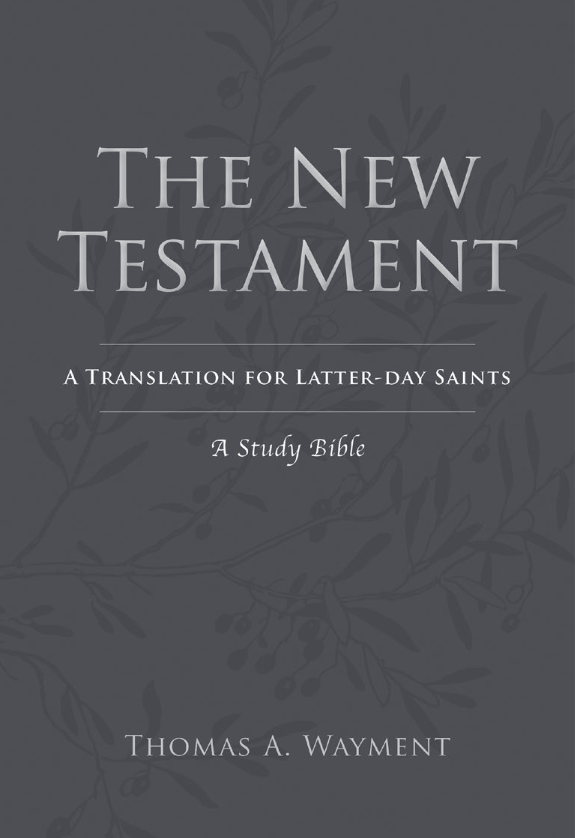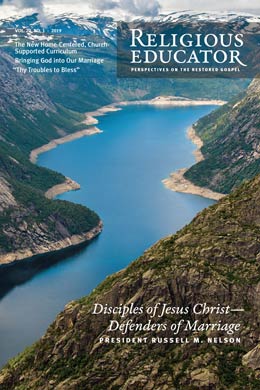Wayment, Thomas A. The New Testament: A Translation for Latter-day Saints, A Study Bible. Provo, UT: Religious Studies Center; Salt Lake City: Deseret Book, 2018. x + 494 pages. Maps. Appendix.
Jason R. Combs (jason_combs@byu.edu) was an assistant professor of ancient scripture at BYU when this was written.

Thomas A. Wayment provides a new, accessible translation of the New Testament with notes that thoroughly integrate the New Testament with Restoration scripture. Why should religious educators use Wayment’s The New Testament: A Translation for Latter-day Saints? Before I summarize some of my favorite features, let me suggest just two possible answers to this question: (1) greater awareness of issues we might otherwise overlook, and (2) new avenues for personal study and research.
Sometimes Wayment’s notes raise our awareness of challenging issues. Imagine that you are reading Matthew 8:28–34, the account of Jesus’s miraculous expulsion of demons into a herd of swine. It is easy to locate this account in the Wayment edition because he has divided the narrative not only by chapter but also by individual accounts (pericopes). This pericope has the heading “Healing of a man at Gadara/
Wayment’s notes also open new avenues for personal study and research. If you were reading Romans 3:12 in the KJV, you might never realize that Paul is quoting Psalm 14:3. In the Wayment edition, however, quotations from the Old Testament are set apart from Paul’s own words with italics. (The KJV uses italics primarily to designate English words added by the translators that do not appear in the original Greek.) In Wayment’s translation, it is clear that everything from Romans 3:10, where Paul says, “as it is written,” to Romans 3:18 is quotation—and not just from a single passage of the Old Testament. Wayment’s notes at the bottom of the page indicate that Romans 3:13 quotes Psalm 5:9; Romans 3:14 quotes Psalm 10:7; Romans 3:15–17 is a quotation of Isaiah 59:7–9 and Proverbs 1:16; and Romans 3:18 quotes Psalm 36:1. Paul is mounting evidence from multiple scriptural sources in order to demonstrate the insufficiency of the law of Moses to save humankind. To understand Paul’s message with greater clarity is in itself a great benefit to Latter-day Saints, but Wayment doesn’t stop there. Returning to Wayment’s note on Romans 3:12, we learn that there is a “similar quotation of this passage from Psalms in 2 Nephi 28:11; Moroni 10:25 (with parallels to Psalms 14:3; 53:2–4).” We have three unique contexts within our standard works where this single verse of a psalm appears! So far, no one has published a study comparing how this psalm is used in each of these contexts. Wayment helps us to see new connections among our sacred scriptures.
There are many more reasons why Wayment’s edition of the New Testament will be useful for religious educators. For instance, the notes often suggest how Restoration scripture interprets the New Testament: consider Matthew 5:8, where Wayment writes, “Interpretation of this verse is found in Doctrine and Covenants 56:18 (compare Doctrine and Covenants 97:16).” Many of Wayment’s introductions to the individual books of scripture include a section titled “Connection to Latter-day Saint Beliefs.” For example, Wayment’s introduction to 2 Corinthians includes a statement regarding Paul’s use of the term “third heaven” and its relationship to “the revelation record as Doctrine and Covenants 76.” In the introductions to each of Paul’s letters, Paul’s life is broadly reconstructed so that teachers and students will know where Paul was when he wrote and what events led to the writing of the letter. I could say much more about Wayment’s edition of the New Testament—I could talk about the formatting, such as his use of stanzas for hymns and poetry, or about his synopsis of the Gospels in the appendix. My description of this book, however, does not do justice to the variety of ways that religious educators throughout the Church Educational System will benefit from Wayment’s work in their own gospel scholarship. My recommendation? Get a copy and go to work!
